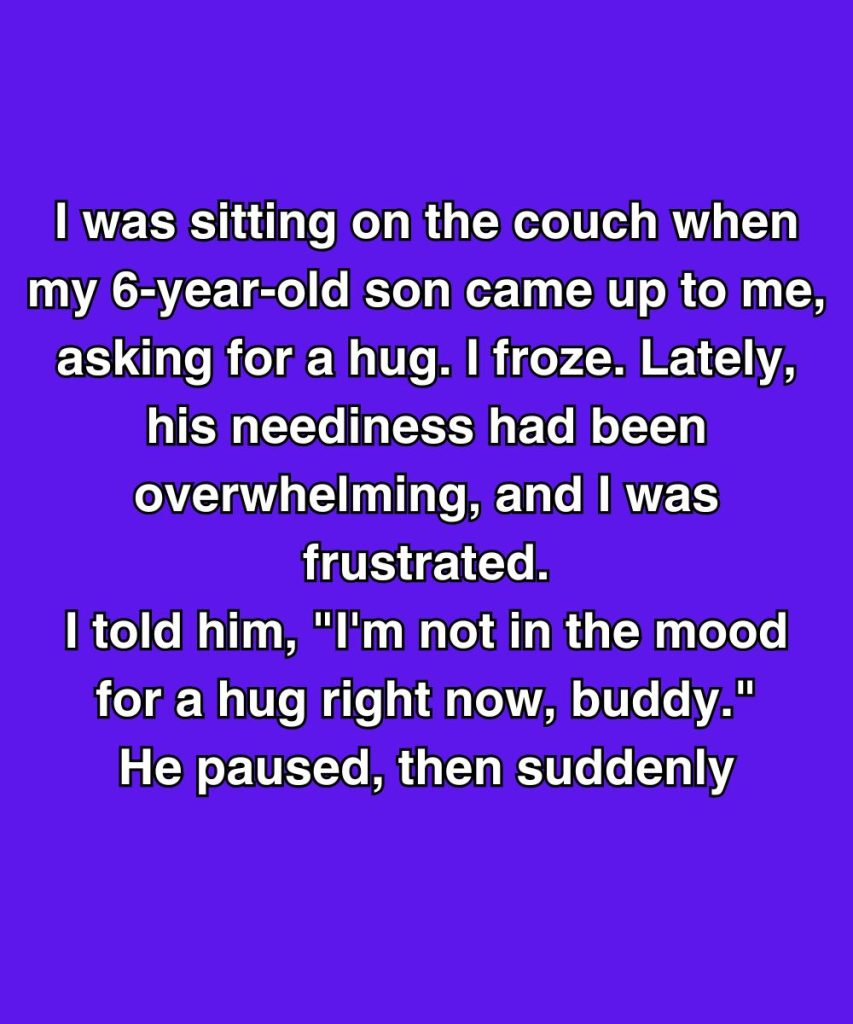I was on the couch when my 6-year-old padded over and asked for a hug. I’d had one of those days—short fuse, long list—and I said, “Not right now, buddy.”
He nodded like a grown-up. “It’s okay. Mommy says you don’t really love me anyway.”
It was flat, not angry. Like a fact he’d memorized.
My whole body went cold. “What did you say?”
“Nothing.” He stared at his socks. “I’ll go play.”
We’d been divorced a year. At first it was civil: handoffs at school, texts about snacks and schedules. Then Kavi started shrinking around me—less laughter, more careful. That one sentence explained everything and broke me in half.
I sat on his bed a few minutes later. “You said Mommy says I don’t love you. Did she really say that?”
He shrugged without looking up. “She says stuff. Like you didn’t want me. Or you’ll forget me when you get a new family.”
I tucked his toy elephant under his arm and kissed his hair. That night, I stood in the hallway after he fell asleep and realized I’d been drifting, letting resentment and exhaustion turn me into someone small.
The next morning I called in sick and took him for pancakes. I told him I loved him more than anything. He said “Okay,” like he wanted to believe it but didn’t know how.
So I started showing him, loudly and often. I picked him up early once a week to do something small and silly: build a robot from junk, make pizza with gummy bears just to be ridiculous, raid the dollar store for the worst toys in history. Slowly, he loosened. He told me more. And what he told me was a slow, steady poison:
“She says you only married her because you were lonely.”
“She says you’re mad because I look like her.”
“She says I’m safer at her house.”
I didn’t want to believe Anara would do it on purpose. We’d promised each other in therapy we’d never weaponize our kid. But the cancellations piled up—“He’s sick,” “Party today,” “We’re busy”—and sometimes I’d arrive at school to learn she’d picked him up early.
I started documenting everything. Not to attack—just to have a record if I needed one.
Then she texted that Kavi didn’t want Christmas with me because “he feels safer here,” and something in me snapped. I offered mediation; she refused. I hired a lawyer. I didn’t want to “win.” I wanted clearer boundaries and time with my son.
The court ordered an evaluation. Interviews, observations, a home visit. I was terrified I’d lost him already. After our third session, the evaluator said, “Your son is loyal to you both. He’s scared to make one parent mad by loving the other.”
That sentence knocked the wind out of me. This wasn’t just her words or my absence. We’d built a weekly war and put him in the middle.
The report recommended equal time and a child therapist. The judge agreed.
The twist came two months later at a birthday party when Anara’s cousin pulled me aside. “I shouldn’t say anything, but… she’s not okay. She’s been drinking. Lost her job. She says you’re turning Kavi against her. She needs help but won’t admit it.”
The next handoff I watched Anara open the door. She didn’t look furious; she looked hollow. I waited a few days and texted: If you’re going through something, I want to help—not to win, for Kavi.
Three days later she sent a voice note through quiet tears. “I don’t know what’s wrong with me. I feel like I’m losing everything.”
We met for coffee. It was awkward and honest. She admitted she’d said things she shouldn’t have and let bitterness run the show. I admitted I’d been faking “fine” and failing. We weren’t friends again. But we stopped being enemies.
We built tiny bridges. Monthly family dinners, clumsy but peaceful. Sitting in the same row at school concerts. Clapping together. Neutral ground became normal ground.
One night as I tucked Kavi in, he whispered, “I like it better now. You and Mommy don’t hate each other.”
“Me too,” I said, and meant it.
A year later, Anara called crying again—happy tears. Six months sober. Part-time job. “Thank you,” she said. I didn’t deserve credit, but I let it land.
Kavi’s nine now. He still asks for hugs all the time. I don’t say no anymore. I know what it feels like to miss a moment you can’t get back.
Parenting isn’t about being strong all the time. It’s about being present. It’s apologizing, trying again when you’re tired, choosing love when it’s inconvenient. If you’ve messed up—especially with your kid—it isn’t too late. You don’t have to be perfect. You just have to show up, again and again.


